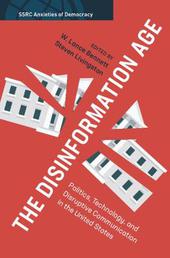
|
The Disinformation Age
Paperback / softback
Main Details
| Title |
The Disinformation Age
|
| Authors and Contributors |
Edited by W. Lance Bennett
|
|
Edited by Steven Livingston
|
| Series | SSRC Anxieties of Democracy |
|---|
| Physical Properties |
| Format:Paperback / softback | | Pages:312 | | Dimensions(mm): Height 150,Width 230 |
|
| ISBN/Barcode |
9781108823784
|
| Classifications | Dewey:320.973014 |
|---|
| Audience | |
|---|
| Illustrations |
Worked examples or Exercises
|
|
Publishing Details |
| Publisher |
Cambridge University Press
|
| Imprint |
Cambridge University Press
|
| Publication Date |
15 October 2020 |
| Publication Country |
United Kingdom
|
Description
The intentional spread of falsehoods - and attendant attacks on minorities, press freedoms, and the rule of law - challenge the basic norms and values upon which institutional legitimacy and political stability depend. How did we get here? The Disinformation Age assembles a remarkable group of historians, political scientists, and communication scholars to examine the historical and political origins of the post-fact information era, focusing on the United States but with lessons for other democracies. Bennett and Livingston frame the book by examining decades-long efforts by political and business interests to undermine authoritative institutions, including parties, elections, public agencies, science, independent journalism, and civil society groups. The other distinguished scholars explore the historical origins and workings of disinformation, along with policy challenges and the role of the legacy press in improving public communication. This title is also available as Open Access on Cambridge Core.
Author Biography
W. Lance Bennett is Professor of Political Science and Ruddick C. Lawrence Professor of Communication at the University of Washington. The focus of his work is how communication affects democratic life. He has held visiting professorships at Harvard, Uppsala, Stockholm, and Free University Berlin. In addition to honorary doctorates from Uppsala and Bern, he has received career achievement awards from the American Political Science Association, the International Communication Association, and the US National Communication Association. His publications include The Logic of Connective Action: Digital Media and the Personalization of Contentious Politics (with Alexandra Segerberg, Cambridge, 2013). Steven Livingston is Professor of Media and Public Affairs and International Affairs with appointments in the School of Media and Public Affairs (SMPA) and the Elliott School of International Affairs (ESIA) at George Washington University. He is also the founding director of the Institute for Data, Democracy, and Politics (IDDP). He has held visiting professorships and fellowships at Harvard University, the University of Cambridge, the Free University in Berlin, Canterbury University in New Zealand, St. Galen University in Switzerland, and the Brookings Institution.
Reviews'This is a hard-hitting book that is richly layered theoretically. It adds much to our understanding of disinformation in democracy while also serving as proof of the necessity of making research on disinformation an area of study across disciplines. The intellectually diverse and distinguished contributors have produced a must-read volume for all interested in disinformation and anyone interested in the future of democracy.' Bruce Bimber, University of California, Santa Barbara 'This volume traces the deep, thorny, and twisted roots of disinformation in American politics. In sobering detail, it lays bare the psychological, institutional, economic, partisan, technological, (geo)political, and regulatory underpinnings of disinformation, making it urgently clear why and how disinformation is neither accidental nor (easily) curable. Yet this book also offers a sliver of hope in the form of implicit and explicit guidance for changes that could help keep disinformation in check.' Amber E. Boydstun, University of California, Davis 'The Disinformation Age offers a sweeping series of chapters from leading scholars that cover the history, politics, implications, and potential solutions to the problem of disinformation in democracy. This expertly curated book eschews disciplinary boundaries to offer a sophisticated holistic understanding of the problem of disinformation. Even more, it knits together the voices of scholars seldom in the same conversation and reveals the power of this emerging field to provide us with ways to protect democracy from those who seek to destroy its epistemological foundations.' Daniel Kreiss, The University of North Carolina at Chapel Hill
|